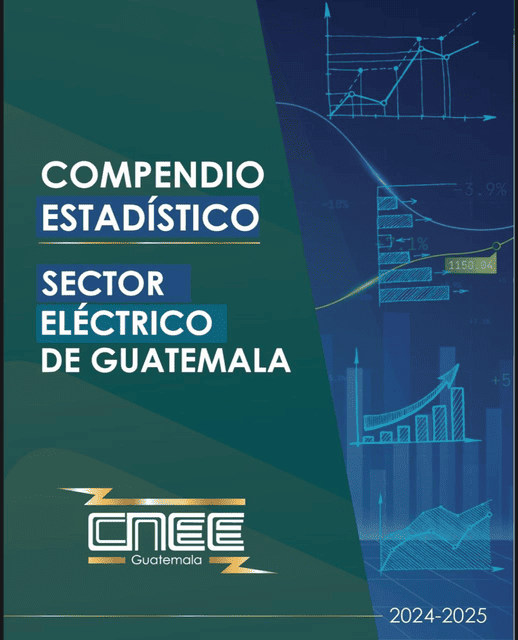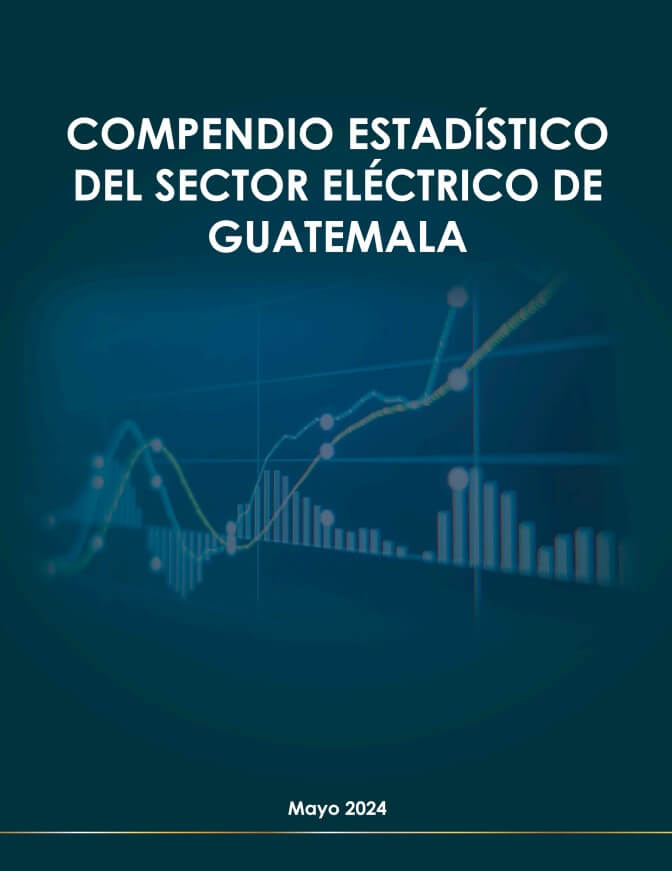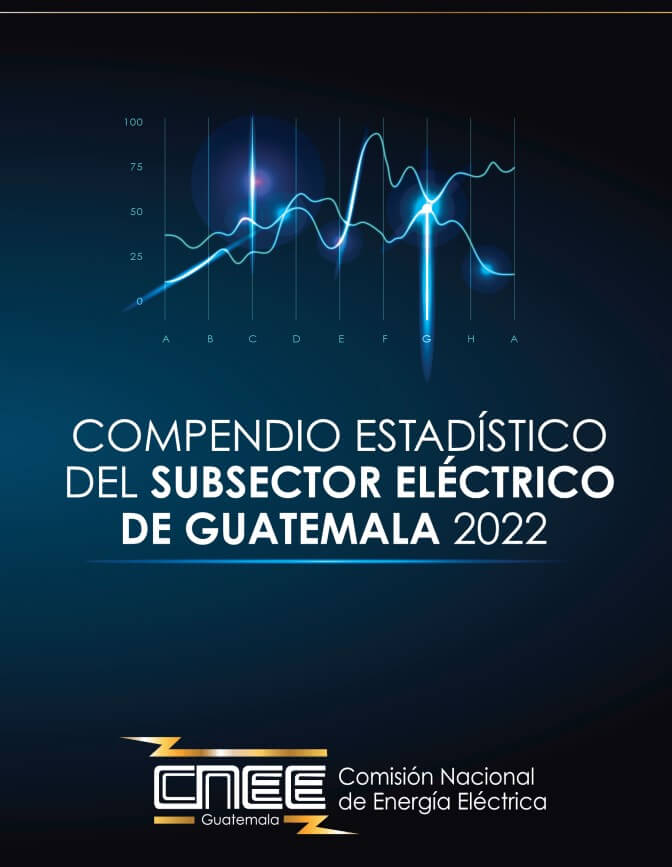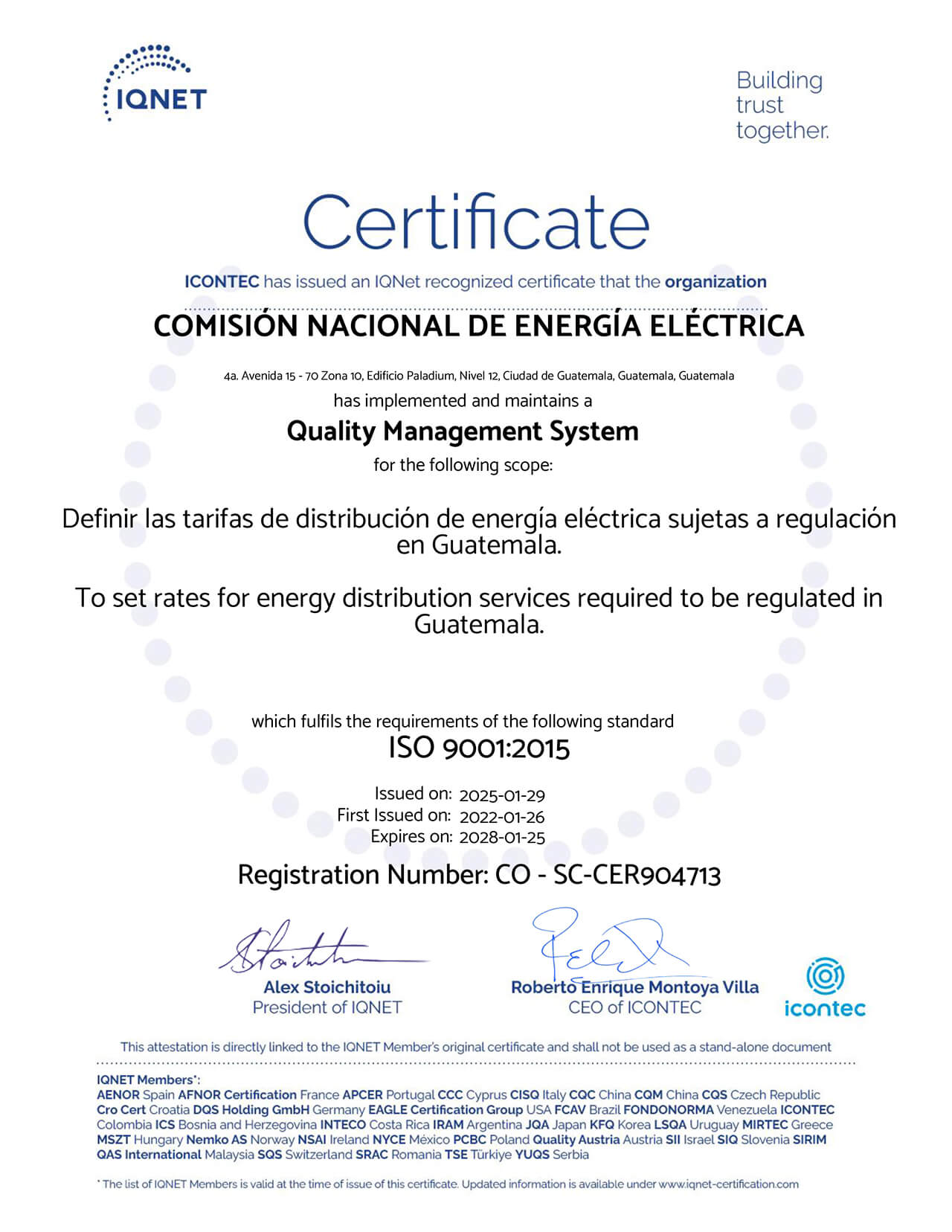What is the CNEE?
The National Electric Power Commission (CNEE)
The National Electric Power Commission (CNEE) is the entity that leads the development of the electricity sector in Guatemala.
The functions of the CNEE are:
1
To enforce and ensure compliance with the General Electricity Law and its regulations.
2
To oversee compliance by licensees and concessionaires, protect users’ rights, and prevent conduct that undermines free competition, as well as abusive or discriminatory practices.
3
To define transmission and distribution tariffs subject to regulation.
4
To resolve disputes arising among electricity sector participants when no agreement has been reached.
5
To issue technical standards related to the electricity sector and monitor their compliance.
6
To issue provisions and regulations to guarantee free access to and use of transmission lines and distribution networks.
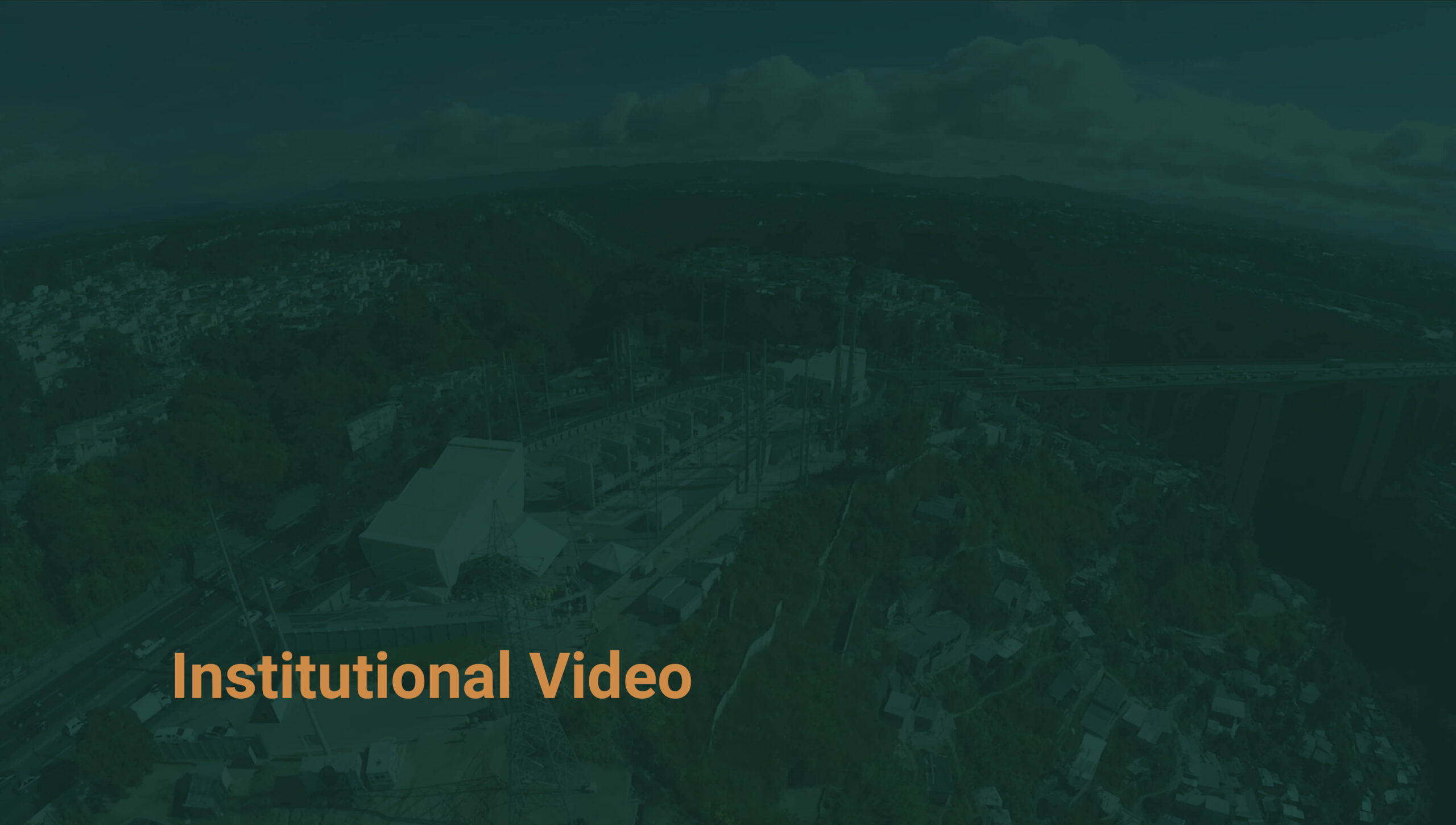
Mission
To ensure compliance with the General Electricity Law and its Regulations, regulating in favor of efficiency, stability, and sustainability in the electricity sector.
Vision
To lead the development of Guatemala’s electricity sector, fostering an environment of competition, efficiency, and investment with world-class quality standards.
Values
Integrity – Maintain impeccable and ethical conduct at all times.
Honesty – Act with integrity in all functions.
CNEE through time

The reform of the electric sector begins, along with a national dialogue with participation from the public and private sectors.
- The dismantling of INDE’s monopoly and the creation of a regulatory body are proposed.
- In 1982, the Aguacapa hydroelectric plant (90 MW) begins operation.
- The Law for the Promotion of New and Renewable Energy Sources is approved (Decree 20-86).
The 1991 energy crisis with 39 days without electricity accelerates the changes.
- The first energy purchase contracts with co-generators, such as sugar mills, emerge due to the State’s inability to meet electricity demand.
- With the INDE Organic Law (1994), the Government’s role in tariff setting is eliminated.
- In 1996, the General Electricity Law is approved.
- In 1997, the National Electric Power Commission (CNEE) was created.
The Social Tariff Law (2000) is approved to support low-income households.
- Expansion of electric coverage through the Rural Electrification Program (PER).
- Renewable generation grows with hydroelectric projects such as Río Bobos, Secacao, Las Vacas, and Renace.
- The Indicative Generation Plan 2008-2022 and the Transmission Expansion Plan 2008-2018 are promoted.
The PEG-1-2010, PEG-2-2012, and PEG-3-2013 tenders are conducted for long-term energy procurement for the distribution companies EEGSA, DEORSA, and DEOCSA.
- The Energy Transmission System Expansion Plans (PET and PETNAC) are implemented.
- The Government launches the Energy Policy 2013-2027 and the National Energy Plan 2017-2032.
- Energy consumption grows 3.35% annually, reflecting increased electricity demand in the country.
Energy planning is strengthened with new procurement processes.
- PEG-4-2022 secures the contracting of 235 MW long-term.
- Energy purchase prices are reduced by 20% compared to previous tenders.
- The participation of renewable energy and natural gas in the national supply increases.
The open tender PEG-5-2025 is launched for the contracting of 1,400 MW of firm capacity and associated energy, with the purpose of covering end-user demand until 2045.
- The open tender PET-3-2025 will contribute to strengthening and modernizing the country’s energy transmission system, enabling the connection of new generation projects and facilitating the expansion of electric coverage in the interior of the country, which will result in a more reliable energy service with greater coverage and better quality.
CNEE Directory
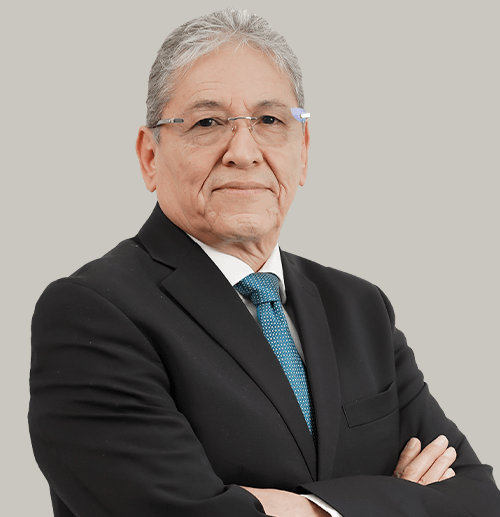
President

Director
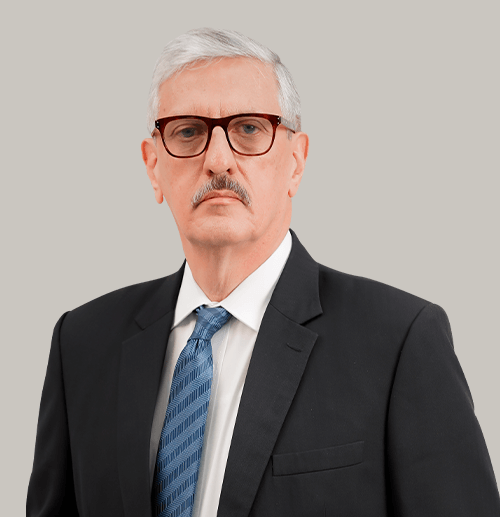
Director
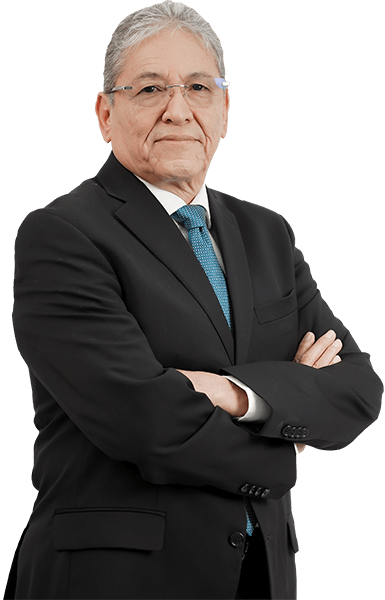
President
Luis Ortiz
Electrical Engineer from the Universidad de San Carlos de Guatemala (USAC), with specialized training in energy topics, including diplomas in privatization and decentralization of the electricity sector from prestigious institutions such as the Catholic University of Chile and INCAE in Costa Rica.
Over more than four decades, he has held senior positions in both the public and private sectors, standing out as Minister and Vice Minister of Energy and Mines of Guatemala, Commissioner before the CRIE, and member of boards such as INDE, AMM, and the Petroleum Commission.
In the private sector, he has served as a national and international consultant on generation, transmission, commercialization, and regulation projects in the electricity sector, providing advice to entities such as the World Bank and regional governments. Since 2022, he has served as President of the CNEE, leading efforts to ensure an efficient, competitive, and sustainable electricity sector in accordance with Guatemala’s General Electricity Law.

Director
Marcela Peláez
Industrial Engineer graduated from the Universidad de San Carlos de Guatemala, with a master’s degree in Finance and postgraduate studies in Energy Business from the Spanish Energy Club and the University of Alcalá, Spain. She has a solid trajectory in the electricity sector, with experience in Guatemala, Central America, Mexico, and Colombia. Over more than 15 years, she has led teams and strategic projects in key areas such as business development, regulatory analysis, tariff policies, and competitive positioning.
Her career includes leadership positions at Grupo Enel, one of the world’s leading electricity sector companies, where she stood out for her regional strategic vision, management of regulatory risks, and creation of new business models. She has also participated in technical committees on energy innovation and electric mobility.
Marcela’s leadership has been recognized for her ability to create positive impact and pave the way for new generations of professional women. In 2025, she was recognized by Revista Summa among the “Leaders Who Inspire” in Guatemala and Central America.

Director
Jorge Aráuz
Lawyer and notary from the Universidad de San Carlos de Guatemala with extensive experience in the public, private, and academic sectors. He holds a master’s degree in Economic and Commercial Law and in Banking and Stock Exchange Operations.
He has held key positions in public administration, including Vice Minister of Energy and Mines and of Economy, Alternate Magistrate of the Court of Appeals, and Secretary General of the Supreme Court of Justice.
Currently, he serves as Director of the CNEE, a position he also held between 2016 and 2017, leading significant initiatives to strengthen legal certainty and institutional capacity in Guatemala’s electricity sector. His leadership has crossed borders, having been Vice President of the Ibero-American Association of Energy Regulatory Entities (ARIAE) in 2016 and actively participating in international energy sector forums. In academia, he has held senior administrative positions at Universidad Rafael Landívar, including Administrative Vice Rector and Acting Rector, in addition to serving as a lecturer and university advisor. Jorge is widely recognized for his commitment to excellence and public service.
Management Team
Marvin Barreto
Tariffs Manager
Fernando Moscoso
Manager of Electric Market Planning and Monitoring
Miguel Retolaza
Secretary General
David Herrera
Legal Manager
Néstor Herrera
Manager of Oversight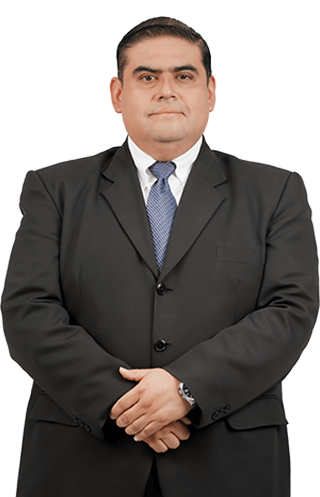

Marvin Barreto
Tariffs Manager
He holds a degree in Mechanical and Electrical Engineering from the Universidad de San Carlos de Guatemala and has completed diplomas in Electric Market, Regulation, and Geographic Information Systems. He has served as Engineering Manager in a multinational infrastructure company and has also worked as Project Coordinator in generation, transmission, and distribution of electrical energy for multinational companies, participating in projects in Guatemala, Mexico, Panama, Ecuador, and Peru.

Fernando Moscoso
Manager of Electric Market Planning and Monitoring
He holds a degree in Mechanical and Electrical Engineering from the Universidad de San Carlos and is a senior member of the Institute of Electrical and Electronics Engineers (IEEE), the world’s leading professional organization promoting technological innovation.
He has an extensive career at the CNEE, having held the following positions: Market Analyst and Project Analyst, Head of Project Planning, Market Manager, CNEE Representative to the Regulatory Support Group at the Regional Electricity Interconnection Commission (CRIE), and his current role as Manager of Electric Market Planning and Monitoring.

Miguel Retolaza
Secretary General
He holds a degree in Legal and Social Sciences, with titles as Lawyer and Notary, and a master’s degree in Public Security, along with postgraduate studies in Public Administration and Policy, Constitutional Law, and Constitutional Procedure.
He has extensive experience in the public sector, having worked in institutions such as the Ministry of the Interior, Ministry of Public Finance, SEGEPLÁN, and RENAP, among others. He is also a university professor in Criminal Law, Criminology, and Criminal Procedure. He has served as Secretary General of the CNEE for two non-consecutive terms.

David Herrera
Legal Manager
He holds a degree in Legal and Social Sciences, with titles as Lawyer and Notary from the Universidad de San Carlos de Guatemala, where he also earned a master’s degree in Environmental Law. He has over 18 years of professional experience in the electricity sector and has served as Legal Manager of the CNEE for more than a decade.
In his current role, he leads the institution’s legal strategy, ensuring legal defense and the protection of the CNEE’s interests in administrative, judicial, and constitutional matters. He also provides legal advice to the Board, the Secretary General, and the different Management areas, guaranteeing that all actions comply with the current legal and regulatory framework.

Néstor Herrera
Manager of Oversight
He holds a degree in Business Administration from the Universidad de San Carlos de Guatemala (2008) and an MBA in Senior Management from Universidad Mesoamericana (2015). He has extensive experience and a long career in the regulation of Guatemala’s electricity sector, having worked at the CNEE for over 20 years.
Achievements
Attracting investments amounting to tens of billions of dollars.
Promoting a high degree of competition among participants in the Wholesale Market.
Maintaining investments in the electricity transmission and distribution network.
Ensuring certainty in the management of authorizations required for various electricity sector activities, such as generation and transmission.
Ensuring compliance with technical standards in the areas of safety and quality of transmission and distribution services.
Maintaining tariff stability for end-users of distribution services, despite complex scenarios such as rising oil prices, international geopolitical crises, and higher costs of raw materials and international transportation.
Management Reports
In this section, you can find the annual management reports of the CNEE. Each document details the actions and results achieved each year in promoting an environment of competition, efficiency, and investment in Guatemala’s electricity sector, contributing to a reliable, high-quality energy service with greater coverage and competitive prices across the country.
Statistical Compendiums
The statistical compendiums developed by the CNEE describe the current situation of Guatemala’s electricity sector, providing relevant information for energy service users, wholesale market participants, and the general public. In these reports, readers can learn about the behavior of the electricity market in the country, details of international transactions carried out, the evolution of tariffs, and the main oversight efforts carried out by the CNEE.
The statistical compendiums developed by the CNEE describe the current situation of Guatemala’s electricity sector, providing relevant information for energy service users, wholesale market participants, and the general public.
In these reports, readers can learn about the behavior of the electricity market in the country, details of international transactions carried out, the evolution of tariffs, and the main oversight efforts carried out by the CNEE.
ISO 9001:2015
A certification that gives us credibility.
The National Electric Power Commission (CNEE) holds ISO 9001:2015 quality certification, with a scope that includes the definition of regulated electricity distribution tariffs in Guatemala.
This certification helps strengthen proper organization in the institution’s operational, administrative, and financial management.
External Audit
Starting in 2025, the National Electric Power Commission (CNEE) is audited by MGI Chile Monroy y Asociados, S.C., recognized for its experience and prestige in auditing, financial, and accounting consulting services in Guatemala.
MGI Chile Monroy y Asociados is part of MGI Worldwide, an international network of independent auditing and consulting firms, ensuring global standards of quality and professionalism. Their expertise and commitment enable the CNEE to guarantee transparency and reliability in its financial and administrative processes.
The CNEE has functional independence to regulate and lead the development of the electricity sector in the country.

